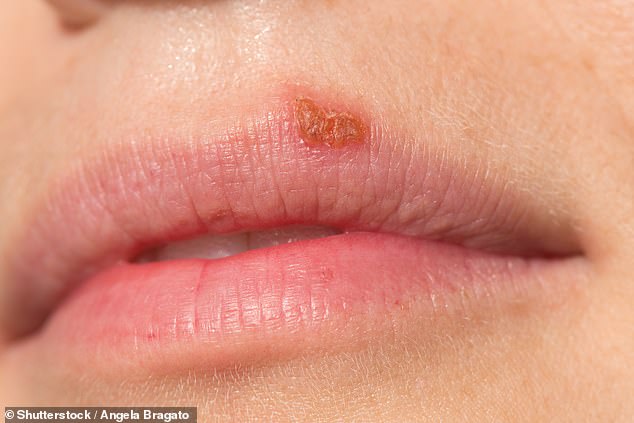They’re uncomfortable, embarrassing, and difficult to get rid of, but cold sores can also be a warning sign of dementia.
Swedish scientists published a paper linking the virus behind cold sores, herpes simplex virus-1 (HSV-1), to an increased risk of the memory-robbing disease.
Studying more than 1,000 older people over 15 years, researchers found that people who had been infected with HSV-1 were twice as likely to develop dementia as those who were not infected.
Scientists aren’t sure why the two conditions may be related, but it may be because it hides in the nervous system for life.
Outbreaks can occur at any time. which can cause inflammation within the nervous system, putting pressure on and damaging the delicate tissue of the nervous system and brain.
The theory holds that, over time, this could lead to some of the changes associated with dementia, such as memory loss, degradation of brain tissue, and confusion.
This is just the latest in a series of articles investigating a connection between common viruses and the risk of dementia later in life.
Recently, scientists have also linked the varicella-zoster virus, which is behind chickenpox and shingles, to changes in brain health.
Cold sores are caused by the herpes simplex virus 1. A different strain of the same virus causes the STD that leads to genital herpes.
Still, experts say the evidence is conflicting and other studies have found no link between the virus and cognitive decline.
HSV-1 affects 50 to 80 percent of American adults, according to Johns Hopkins. This virus is similar, but not the same, to the virus that causes the sexually transmitted disease (STD) herpes.
It reportedly even affects celebrities like comedian Jim Carrey and singer Usher.
The virus is primarily transmitted through intimate person-to-person contact, such as kissing or oral sex, although in some rare cases it can be transmitted through sharing drinks.
It can also be passed from mother to child in the womb and can cause serious side effects in children.
Once someone contracts the disease, many of the symptoms are manageable and mild. Initial signs include fever, swollen lymph nodes, sore throat, and sores inside the mouth and gums.
After the initial outbreak, symptoms may disappear completely, before periodically appearing on the side of the mouth or lip as a red, ulcerous sore.
During one of these outbreaks, doctors may prescribe antiviral medications or ointments to relieve discomfort or instruct patients to take over-the-counter pain relievers such as ibuprofen to control inflammation.
For a long time, doctors thought this unpleasant visitor was one of the only lingering effects of the disease.
However, in recent years a more worrying link has emerged.
This includes the team of researchers from Uppsala University, who published their findings in December 2023 in the Alzheimer’s Disease Journal.
Their study followed 1,002 Swedes, of whom 80 percent are HSV-1 carriers, over the age of 70 over a 15-year period.
They adjusted for factors such as educational level and genetic predisposition to Alzheimer’s.
At the end of the study, 32 subjects had developed Alzheimer’s disease and 63 percent had developed another form of dementia, representing a total of 11 percent of the participants. Eighty-nine percent of those people had herpes.
The researchers then compared these people to the rest of the group, who had not developed dementia at the end of the study, in which 82 percent of the participants had herpes.
After adjusting for TK, they concluded that those who contracted herpes were twice as likely to have developed some form of neurodegeneration.
They note that their limitations include that they could not adjust for the effect that age may have on the data, nor could they rule out other factors such as medications, heart disease and diabetes.
In the United States, an estimated 4 percent of adults over age 65 have dementia. In comparison, experts at Johns Hopkins It is estimated that between 50 and 80 percent of the population has HSV-1.


Up to 80 percent of Americans may have some form of the herpes virus. Usher’s diagnosis became public in 2019 following a lawsuit. Jim Carrey’s diagnosis became public amid a lawsuit from an ex-girlfriend in 2017 who claimed the actor failed to inform her of his condition.
Your article is not the first to link the two.
A study from 2024 of South Korean researchers using data from a national health insurance service that included more than 750,000 people, found that people who had HSV and varicella zoster virus (VSV) were more likely to develop dementia.
However, not all studies investigating these two factors have found a link. A review from 2019 from several UK universities found that the link between dementia and HSV-1 was inconclusive and did not establish a strong association.
Dr. Jagan PillaI, a cognitive neurologist at the Cleveland Clinic, told Parade that the studies are not convincing enough to conclude that herpes could cause dementia. Of the 2019 study from the United Kingdom, he said: “it supports the need for future studies of better quality.”
Plus, said Dr. Monica Gandhi, an infectious disease specialist at UC San Francisco. Medical news today Rates of herpes infections in general are much higher than rates of dementia.
This difference, he said, is evidence that they may not be related.
She said: “Given how common herpes virus infection is among young people, I wouldn’t let this study worry them too much.”


